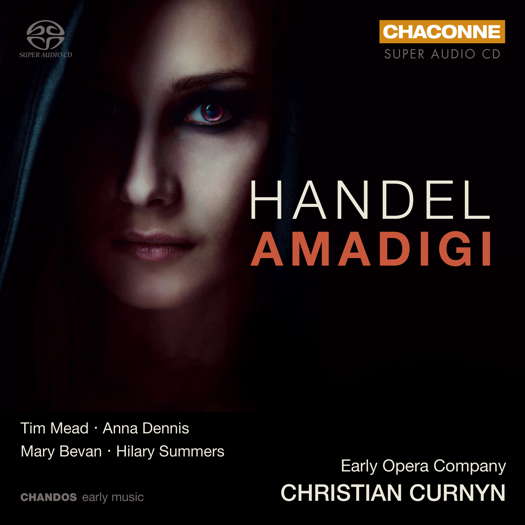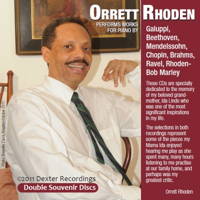 SPONSORED: The Many Hats of Allan Rae - A Birthday Greeting, by Endre Anaru.
SPONSORED: The Many Hats of Allan Rae - A Birthday Greeting, by Endre Anaru.
All sponsored features >>

Inner Turmoil
Handel's 'Amadigi di Gaula', strongly recommended by GERALD FENECH
'... full of passion and angst.'
Georg Friedrich Handel arrived in England in 1710, but within a short period his musical genius was on everybody's lips. Indeed, while he was composing Amadigi di Gaula in 1715, he had already written four other Italian operas for an English theatre. This opera, about a damsel in distress, is based on Amodis de Grece, a French tragedie-lyrique by Cardinal André Destonches and Antoine Houdar de la Motte, but the libretto's author remains somewhat of a mystery. Three names are credited with being the possible writer: John Jacob Heidegger, Giacomo Rossi and Nicola Francesco Haym, but from recent research it seems that the latter was indeed the one, although doubts still persist.
Amadigi, composed for Richard Boyle, Third Earl of Burlington, was premiered at the King's Theatre in the Haymarket on 25 May 1715 in a lavish, successful production. The King, George I, attended several performances, and the opera received a known minimum of seventeen further performances in London until 1717. Hamburg also saw seventeen stagings from 1717 to 1720 but with a different title, Oriana. Sadly, Amadigi soon fell into neglect after this date, and it was only revived in 1929 in Osnabrück and subsequently in England in 1968.
Since its North American premiere in March 2003, Amadigi has made more inroads in several theatres worldwide and this recording is the fruit of its growing popularity. The story has many twists and turns, and as was the custom in Handel's time, it borders on the magical.
Listen — Handel: Ouverture (Amadigi)
(CHSA 0406(2) CD1 track 1, 0:01-0:44) ℗ 2022 Chandos Records Ltd :
In Act I, Amadigi, a Paladin and Dardano, the Prince of Thrace, are both in love with Oriana, the daughter of the King of the Fortunate Isles. Oriana prefers Amadigi in her affections, but the latter is also the subject of the sorceress Melissa who tries to capture Amadigi's affections by various spells, pleadings and even threats. Amadigi confronts various spirits and furies, but rebuffs them all at every turn. One particular vision at the 'Fountain of True Love', however, of Oriana courting Dardano, upsets Amadigi to the point that he faints. Oriana sees Amadigi prostrate and is about to stab herself with his sword when he awakens. He scolds her vehemently for her supposed betrayal and in turn tries to stab himself.
Listen — Handel: O rendetemi il mio bene (Amadigi Act I)
(CHSA 0406(2) CD1 track 26, 4:45-5:24) ℗ 2022 Chandos Records Ltd :
Still alive, Amadigi continues to resist Melissa's advances in Act II. The sorceress then makes Dardano look like Amadigi to deceive Oriana. The latter follows Dardano in the visage of Amadigi to beg forgiveness. Dardano is elated, and in a moment of impulsiveness, he challenges Amadigi to single combat. In the ensuing duel Dardano is killed. Melissa meanwhile accuses Oriana of stealing Amadigi from her and calls upon the dark spirits to assault Oriana, who in turn resists all of Melissa's incantations.
Listen — Handel: Desterò dall'empia dite (Amadigi Act II)
(CHSA 0406(2) CD2 track 17, 0:59-1:58) ℗ 2022 Chandos Records Ltd :
At the start of Act III, Amadigi and Oriana have been imprisoned by Melissa. The two lovers are prepared to sacrifice themselves for each other. Though seeking revenge, Melissa cannot quite yet kill Amadigi, but torments him by keeping him in chains. The two lovers ask the sorceress for mercy, but Melissa summons the ghost of Dardano to assist her in her revenge. The ghost lets Melissa know that the gods are ready to protect Amadigi and Oriana. Rejected by everyone, Melissa kills herself. Just then Orgando, Oriana's uncle and a sorcerer himself, descends from the sky in a chariot and blesses the union of Amadigi and Oriana. A dance of shepherds and shepherdesses concludes the opera.
Listen — Handel: Godete, oh cori amanti (Amadigi Act III)
(CHSA 0406(2) CD2 track 33, 0:00-0:24) ℗ 2022 Chandos Records Ltd :
Although the story does not really stir the imagination, Amadigi is considered by many to be the finest of Handel's early London operas in terms of musical sophistication, theatrical pacing and a perfectly balanced exploration of the interconnected relationships, motivations and emotional divergence among just four dissimilar yet equally arresting characters. What interested Handel was the inner sufferings of the four characters, and by using wind instruments prominently, the composer succeeded in conveying the inner turmoil of the four protagonists with telling effect. Indeed, if you get really involved in the music, you will find yourself enmeshed in this whirlpool of pain without your knowing.
Listen — Handel: Addio, crudo Amadigi! (Amadigi Act III)
(CHSA 0406(2) CD2 track 27, 0:00-0:24) ℗ 2022 Chandos Records Ltd :
Christian Curnyn's unbridled empathy with this score is all too evident in his subtle and graceful conducting, which draws from both his Early Opera Company singers and players performances of the utmost humanity, full of passion and angst. Not vintage Handel, true, but this opera certainly deserves to find its way in anyone's collection. Sound and booklet notes are in the best Chandos tradition. Strongly recommended.
Copyright © 12 September 2022
Gerald Fenech,
Gzira, Malta

CD INFORMATION - HANDEL: AMADIGI DI GAULA



